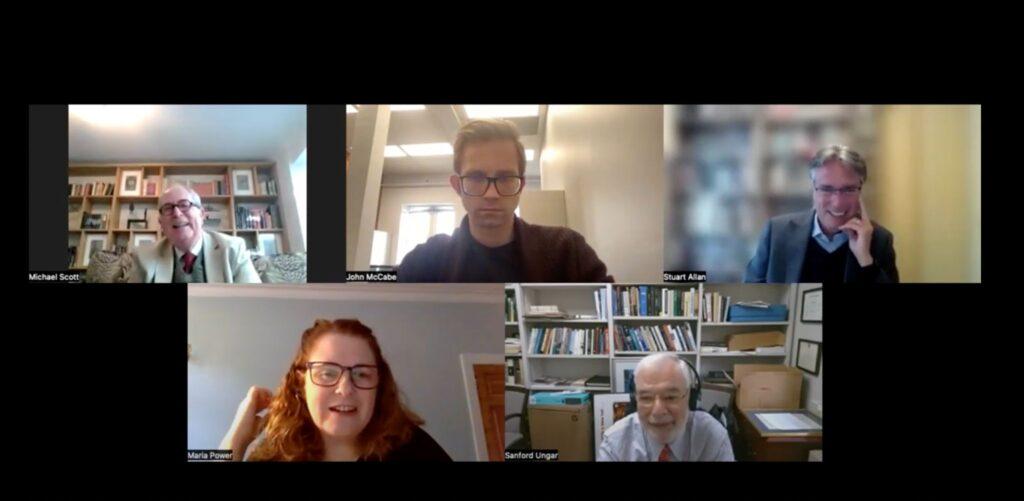Faculty and students organized a virtual panel with journalism experts from across the nation to discuss the evolving role of the media in strengthening democratic institutions and upholding traditional journalistic values.
The Oct. 17 event, titled “Can Local Media Help Save Democracy?” was co-hosted by the Free Speech Project at Georgetown University (FSP), a student- and faculty-run initiative that works to assess the condition of free speech in the United States today, and the Future of the Humanities Project at Georgetown University, a collaborative effort between the Georgetown University Humanities Initiative and the Las Casas Institute at the University of Oxford, a research institute examining social issues related to the Dominican intellectual tradition, to address issues at the intersection of the humanities and public life.
The panel included Stuart Allen, professor of journalism and communication at Cardiff University; Jim Brady, former executive editor of the online version of the Washington Post; and Maria Power, a senior research fellow studying human dignity at the Las Casas Institute.

The event was moderated by the director of the Future of the Humanities Project, Michael Scott, and the director of the FSP, Sanford Ungar. The event is the latest installment of the FSP’s ongoing series, “Free Speech at the Crossroads: International Dialogues,” which aims to facilitate conversations among interdisciplinary experts regarding issues of free expression.
Panelists discussed the shifting priorities of national media outlets, something Brady said has led to the deterioration of the quality of their journalism.
“National media is incentivized to anger people,” Brady said at the event. “It is driven by ratings and page viewership, and until the incentives of national media change to producing quality content, we won’t see change.”
Power said that the deteriorating reputations of media companies are partly because of the constant influx of bad news.
“Actual news is exhausting and depressing, and people are consequently looking to journalism for entertainment,” Power said at the event. “I have lost count of how many people I can actually have a conversation with about politics and economics because of the decline in the academic sphere.”
Panelists also discussed the ways local media can fill the gap left by the national media’s shortcomings, something Brady said can unite communities without focusing as much on politically polarizing topics.
“Regardless of if you’re a Democrat or Republican, you share the same emotion of hating traffic and favoring the local sports team,” Brady said. “Local news can be boring at times, but there are lots of things that go around in your community which are important. I do think if we give more of a supply of information that is useful and necessary in a community, it can help to short circuit the corrosive effect national news has on people right now.”
Despite the ideological strengths of local media, Brady said many local news outlets are struggling to stay afloat financially.
A report from Northwestern University on the state of local news in America found that newspapers have been vanishing at increasing rates in recent years. One-fifth of the nation’s citizens live in news deserts, or communities that are no longer covered by daily or non-daily newspapers, and surviving newspapers have cut their staff and production following declines in profits.
Power pointed to the efforts of U.K. Prime Minister Liz Truss, who announced on Oct. 20 that she intends to resign from her role following a contentious parliamentary vote, as an example of the threat a strong local media can pose to undemocratic leaders.
Power said Truss attempted to bankrupt local media and keep outlets from being able to produce content.
“The local media in the U.K., which is publicly funded by the BBC, were viewed as idiots by Prime Minister Liz Truss when she entered office,” Power said. “She has since worked hard to defund the BBC, but the local media have continued to run rings around her and hold her accountable.”
Ungar said that local media is particularly hurt in times of financial crisis, as these publications’ profits are largely dependent on voluntary user subscriptions and donations rather than advertisements.
“Simply asking people to donate to local media amid a time of inflation is a ‘tough sell,’” Ungar told The Hoya in an interview after the event.
Brady said that by prioritizing their readers’ interests, local news outlets can increase their donations.
“You have to address your audience, you have to cover things they care about,” Brady said. “Now we’re focusing on things that actually get people to give money to the organizations because they like the work, which means for the first time really in the history of digital, the business model and the editorial model thrive the same way.”





















